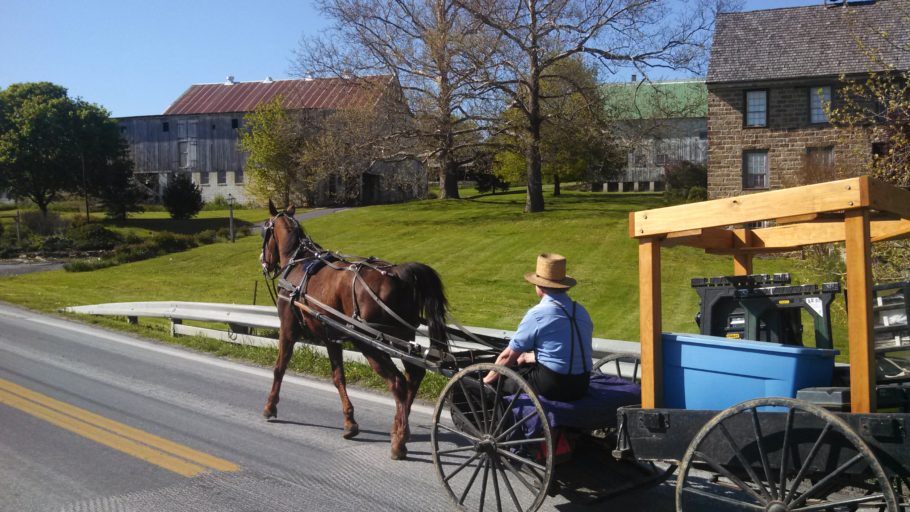
I’m sitting in Corner Coffee Shop in Intercourse,1 Pennsylvania – Amish country – watching traffic go by while I write this post. A constant stream of cars and semis whiz along the narrow, two lane road running through town. Sometimes black buggies pulled by beautiful black or brown horses driven by Amish locals slow the traffic a crawl.
It’s a fitting metaphor, those horse drawn carriages backing up the traffic. The Amish, and their spiritual cousins, the Mennonites, have been slowing things down here for two hundred fifty years.
I’m related to these people. My mother, Marguerite Reese, was an Eby. I remember her saying, “There’s a book in the downtown Los Angeles Public Library that talks about my relatives.” Unfortunately, a fire at the library destroyed it before I got around to looking it up.
I had no idea how colorful my distant ancestors were until I began my own research several years ago. It turns out my 7th great-grandfather, Theodorus Eby, was invited by William Penn to help settle Pennsylvania.
Theodorus Eby was a Mennonite. His distant ancestors were Waldensians who lived in Northern Italy in the Middle Ages. During the Inquisition, as a result of the persecution that came with it, the Waldensians fled to Switzerland where they joined with Menno Simons’ followers, the Mennonites.
Following the Reformation, Mennnonites experienced persecution there as well. So they moved to the Rhine River valley in Germany. Unfortunately, they again experienced persecution. But this time they learned about Pennsylvania and its religious tolerance. So, at the invitation of William Penn, they moved en mass to Lancaster County in the early 1700’s.
Theodorus Eby was one of the first Mennonites to arrive. Hence his full name, “Durst Theodorus Eby,” or “First Theodorus Eby.” His home, pictured above, stands as a historical landmark in Lancaster County. One of his sons, Christian Eby, built a mill just north of nearby Lititz. It is still in operation and his home across the street from it is also an historical landmark.
At one time, a descendant of Theodorus Eby’s owned a third of the land that is now the city of Landcaster, PA. Patti and I have been exploring this area for the last couple of days and it’s been fun seeing the Eby name pop up here and there. There’s an Eby gift shop three blocks down from the coffee shop I’m in. There is also an Eby General Store, an Eby Graveyard, Eby Road, and even an Eby dentist.
Following the War of Independence, many Ebys, who were pacifists, immigrated to Canada, where Benjamin Eby founded Ebyville, in Ontario. His move is why my mother was born in Ontario, Canada, and not in Pennsylvania. Ebyville is now called Kitchner and has a population of 250,000. There’s even a Canadian History Channel video entitled, “Benjamin Eby Goes to Canada”!
Back in Pennsylvania, we can easily romanticize the Amish lifestyle: huge families, lush farms, and carriages with horses pulling them make an instant impression. But their lifestyle hides one of the most severe forms of legalism I’ve ever seen. Groupthink controls every aspect of their culture and fosters pride toward “the English,” which is everyone who isn’t Amish.
External conformity without interior transformation leads inevitably to the hypocrisy I observed when I looked into one Amish carriage: its simple black exterior hid an elaborate interior with a fancy, hand carved dashboard that had a cigarette lighter in it!
Paul’s description of a legalistic religious group in his day applies to the Amish as well:
“I can testify about them that they are zealous for God, but their zeal is not based on knowledge. Since they did not know the righteousness of God and sought to establish their own, they did not submit to God’s righteousness. Christ is the culmination of the law so that there may be righteousness for everyone who believes.”2
And Paul’s warning about legalism applies to us:
“It is for freedom that Christ has set us free. Stand firm, then, and do not let yourselves be burdened again by a yoke of slavery.”3
This post first appeared in NewCommandment.org.
Learn how to meet every pressing need in your church here.
_______________________________________________________________

Learn how to form teams of men for every widow, single mom
and fatherless child in your church at NewCommandment.org.
_______________________________________________________________